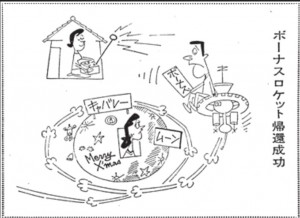Keith Ujikane and Tru Fujioka write: Japanese drew down savings for the first time on record while wages adjusted for inflation dropped the most in almost five years, highlighting challenges for Prime Minister Shinzo Abe as he tries to revive the world’s third-largest economy.
Real earnings fel 4.3 percent in November from a year earlier, a 17th straight decline and the steepest tumble since December 2009, the labor ministry said today.
A higher sales tax combined with the central bank’s record easing are driving up living costs, squeezing household budgets and damping consumption. Abe’s task is to convince companies to agree to higher wages in next spring’s labor talks to sustain a recovery.
Abe is trying to generate a virtuous cycle in the economy, where higher incomes fuel consumer spending, which in turn prompts companies to boost investment and wages. Last week he secured a pledge from business leaders to do their best to boost pay next year. The government will aim for wages to increase faster than inflation.
The savings rate, which the Cabinet Office calculates by dividing savings by the sum of disposable income and pension payments, peaked at 23.1 percent in fiscal 1975.
As Japan’s population ages, its growing ranks of elderly are tapping their savings, according to the Cabinet Office. Consumers also ran down savings to make purchases ahead of a sales tax-increase in April, the first since 1997.
Japanese officials for years rebutted American pressure on their commerce policies by attributing much of the trade gap between the two nations to Japan’s higher savings rates. The central bank chief said in 1993 that Japan’s trade surplus would remain because of its high savings rate. The country’s top trade negotiator was cited in 1994 saying “Americans should save more, and Japanese should spend more” to balance trade.
Japan’s shrinking workforce is intensifying a labor shortage that Kuroda has said will prompt an increasing number of companies to boost pay to secure workers. So the Bank of Japan and Abe hope.

